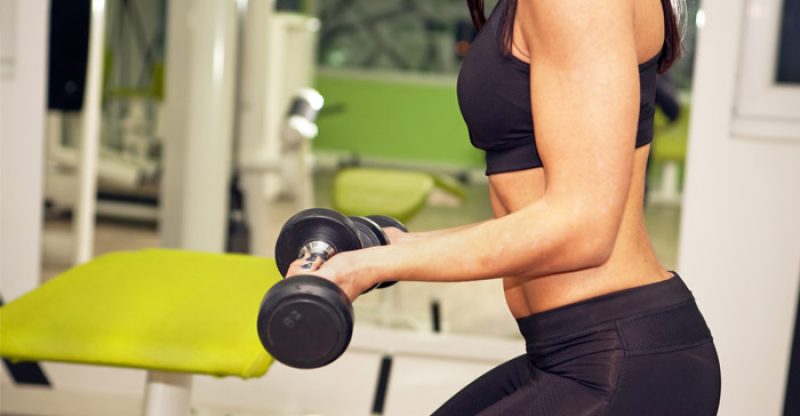Mental Health Benefits of Exercise: How Sports Improve Brain Function
We often hear that exercises are important.
They are claimed to be the best way to lose weight or simply get in a good shape and they are also supposed to make us healthier.
However, to many of us, that’s not enough. And it’s understandable, really.
When you feel exhausted after a long day, the last thing you want to do is to start working out.
Sure, you probably still remember about of those benefits of exercising, but the possibility of lowering the risk of heart diseases might still look like something too unclear and not convincing enough to put on your running shoes or go to the gym.
However, there are two massive reasons for you to change your mind.
And the first of them is that while being active does make you healthier, being inactive doesn’t simply keep you in the same shape and health condition – it actually worsens your health.
How Being Inactive Affects Your Health?
Now, this might seem unpleasant but it’s true.
According to World Health Organization, physical inactivity causes approximately 3.2 million deaths worldwide, therefore being the fourth leading risk factor for global mortality.(1)
The reasons for physical inactivity are more or less obvious.
The development of technologies allows more and more people to work from their homes and to entertain themselves without even leaving the room.
People have cars as well as public transport to get to work, which causes them to move less as well.
The urban changes affect physical activity as well: violence, pollution, lack of sports and recreation facilities are also named the most common causes of physical inactivity.
On top of that, while it becomes more and more important to take care of your health as you get older, it also becomes much harder to do so.
Inactivity tends to increases with age because the will to exercise becomes weak.
The health condition could also worsen, therefore making exercising even more challenging.
However, being inactive has the following drawbacks:
- the risk of becoming overweight or obese, followed by the most common health problems for these conditions;
- the risk of developing type 2 diabetes;
- the risk of developing high blood pressure;
- the risk of developing depression and anxiety (or worsening them if one already suffers from them);
- the risk of developing coronary heart diseases (if one smokes, drinks alcohol, or sticks to an unhealthy diet, this risk only grows).
Exercising, on the contrary, helps to prevent these things – but there’s much more about it.
The second massive reason to start working out is to improve your mental health.
How Does Exercising Improve Mental Health?
Though the quality of our lives improves, many people don’t feel it.
Another statistics provided by World Health Organization shows that more than 300 million people of all age worldwide suffer from depression.(2)
And, sadly, depression is not the only mental condition that worsens our lives – there’s also anxiety, apathy, and so on.
Sure, it’s possible to treat these conditions with medicine – but it’s also impossible to quickly improve both your mental state and brain with the help of regular exercises.
Here’s how it works.
Exercises Can Reduce Stress
Though a high-intensive workout might not seem like a good idea after a long and exhausting day at work, it’s actually the best and the quickest way to start feeling better.
And it’s not only high-intensive workouts that count – even a quick and moderate one can help you manage both your physical and your mental stress better.
Working out increases the concentration of norepinephrine in our bodies.
It’s a chemical that helps the brain cope with stress more effectively, easing both current mental tension and long-lasting stress.
Exercises Can Help Boost Memory
The hippocampus is the part of the brain that lies at the core of both memory and learning systems.
When it grows, we become able to memorize things better.
What does working out has to do with that?
Researches show that hippocampus reacts strongly to aerobic exercises, growing and therefore helping to boost your memory.
That’s why working out can help you in the long run.
However, it could help you instantly as well.
If you combine learning with a moderate physical activity (such as cycling or walking), you’ll remember things better.
The tricky part here is that you have to learn while working out.
But knowing how many online programs are there, this is a challenge you could handle.
Exercises Can Help Improve Concentration
Lack of focus is a common problem for many.
We get distracted all the time: by emails, by smartphones, by various articles popping on social media, etc.
The 2015 study showed that the average attention span of adult back then was 8 seconds (compared to 12 seconds in 2000, before the mobile revolution began).(3)
Sounds upsetting, isn’t it?
But we are able to change this by investing time into regular exercising.
This 2014 research, as well as many others, show that working out daily can make your more capable of withstanding various distractions, skilled at multitasking, memorizing information and manipulating it, and better in focusing your attention on different things.(4)
Exercises Can Improve Self-Confidence
Of course, your body changes when you work out regularly.
And, of course, it isn’t surprising that your self-esteem changes, as well as you, become slimmer and fitter.
What is surprising and amazing is that this happens very quickly.
You might not be in your dream shape yet – but you’ll still feel much better about yourself as well as attractive.
This happens regardless of age, gender, size, and weight.
And what’s even more important is that it isn’t only about the physical appeal.
You start thinking better about yourself in general, seeing that you have enough willpower and persistence to keep exercising.
This leads to another much-expected consequence – you start doing your daily activities and work duties better.
And your risk for falls decreases significantly, which is also amazing.
Exercises Can Boost Happy Chemicals
Exercises release endorphins – that’s almost a common knowledge.
What is less commonly known, however, is that these endorphins (also called «happy chemicals») make your happier not only for a short amount of time.
Sure, an endorphin release during the workout feels unbelievably great, but even after it goes away, the positive impact it had on your body remains.
According to the studies, working out can even make clinically depressed people feel better, often being just as effective as antidepressant pills.(5)
Exercises Can Reduce Anxiety
One of the worse things about anxiety is that when you have it, you involuntarily focus on the things that make you anxious – which is, of course, one of the quickest ways to become even more anxious.
However, you can change that by working out.
ADAA research shows that exercising can also decrease the symptoms of anxiety: one workout reduces them for hours, while regular ones lead to a significant decrease over time.(6)
Moreover, exercises distract you from anxiety as well as it becomes hard to focus on something else when you need to count the number of your push-ups or watch your posture, for example.
Exercises Can Help Control Addiction
Dopamine is the chemical that lies at the core of every addiction.
When released, dopamine makes you feel great almost instantly – so it’s no wonder that many people want to experience this feeling more and more often.
Sadly, there aren’t many substances that provoke dopamine release.
The most commonly known of them are drugs, alcohol, sex, food, and exercises – and many people tend to rely on the first two mostly.
Moreover, dopamine addiction is what makes quitting incredibly hard.
After all, it’s not easy to quit something that makes you feel so good.
That’s why one of the best ways to control an addiction and to overcome it initially is to start exercising.
This way the body will still experience dopamine releases, only in a much healthier way.
Even short workouts help to distract people suffering from addiction and to encourage them to de-prioritize their cravings.
Exercises Can Help You Relax
There are plenty of people suffering from insomnia – and there are also plenty who experience sleep troubles in general.
Even if one can fall asleep quickly, this still doesn’t mean they don’t wake up at night often or don’t feel exhausted in the morning.
Working out, however, can help you both with falling asleep easier and with improving the quality of your sleep.
The best way to get the most out of your exercises is to do them five to six hours before you plan on going to be.
This way you’ll feel sleepy just when necessary.
Exercises Can Boost Your Creativity
There’s an advice often given to creative people: if you feel stuck, go for a walk.
The reasons behind this advice are simple: you are supposed to get some distraction from a current project, to relax a bit, and to clear your mind a bit.
Walking does help, but because of a different reason: according to 2014 research, it boosts creative thinking, helping you generate ideas easier.(7)
Moreover, this approach can help anyone who feels stuck, not only creative people.
Exercises Can Slow Cognitive Decline
The last (and the biggest) benefit of exercises is that they can slow cognitive decline, helping your brain to stay sharp and healthy even at an old age.
Moreover, you don’t need to work out extremely for that too: even walking three times a week could be enough.
However, if you want to make the most out of it, you should start as early as possible to help your body get used to a regular physical activity.
So if these benefits do seem impressive to you, you can consider adding exercises to your daily routine.
But how should you do so?
How to Develop a Working Out Habit?
To many people who never worked out before, did it long ago or simply didn’t do it regularly, starting an exercise routine might seem very challenging.
However, the good news is that you don’t have to get too extreme right from the start.
In fact, it would be much better for you to start slowly and to move gradually.
Track Your Activity
This important because of a number of reasons.
First, it allows you to evaluate your daily activity levels. Second, it could motivate you to move more.
Third, it might also encourage you to rethink your lifestyle a bit.
There are plenty of ways to track your movement.
You can purchase a fitness tracker if you feel like it would be useful to you later as well or install movement-tracking apps on your phone (in this case, just don’t forget to carry it with you during the day).
Often we don’t understand exactly how little we move until we see the numbers.
So analyzing your daily activity can be not only a good first step but actually an eye-opening thing.
Try Moving a Bit More
Sure, you can start by going for long walks daily – but if it’s new and not very comfortable to you, you’ll probably quit it soon enough.
Instead, consider changing some of your daily habits a bit.
For example, walk the stairs instead of using an elevator (assuming you don’t have to walk 15 floors, of course).
Get out of the bus a few stops before your home or your work and walk this distance.
Set a reminder to get away from your work desk every hour a two.
Add a More Serious Activity to Your Routine
If you didn’t feel very uncomfortable during the first two stages, you might feel tempted to start working out more seriously by this time.
However, that’s not a good idea.
One of the most common misconceptions is that anyone should just start working out.
In fact, for both overweight people and people who didn’t do many physical exercises before, it won’t be very effective.
Before you start exercising, you need to help your body get used to regular activity – otherwise, you might stress it too much.
So after you create some healthy habits, consider building a more serious one – for example, taking 20-40 minute walks daily or cycling to your work.
Just be sure to keep it moderate.
There are two things that indicate that you exercise at a moderate level without straining your body too much:
- You feel warm during the activity but don’t drip with sweat and don’t feel overheated.
- Your breathing is heavier than normal but you aren’t running out of breath at the same time.
Choose an Activity that You Love
Another common misconception is that you don’t have to like working out – you just have to keep doing it.
In fact, if you do enjoy your workouts, you won’t need to motivate yourself to start them each time, you’ll perform better, and you can even achieve results quicker.
However, in order to so, you might need to invest some time first to find the activity that seems right to you.
Of course, some exercises are more challenging than the others.
Some guarantee results quicker than the others.
But if you are in this run because of your health and not because you want to get into a perfect shape as quickly as possible, you should still aim for those types of physical activity that seem the most appealing.
So try different things and don’t punish yourself for quitting something you don’t like.
As soon as you’ll find the right activity for you, you’ll stick to it willingly.
How to Overcome Your Mental Obstacles?
While building a workout routine might not seem like a challenging process to you, sometimes you might still struggle with it.
Actually, it’s not the lack of time or plan that usually stops people from turning exercising into a regular routine – it’s the mental obstacles they struggle with during the process.
This happens especially often with those, who have various mental health conditions, making it even harder for them to break the vicious circle.
However, those who don’t have mental health problems can struggle with such obstacles as fell.
So let’s focus on the most common things that prevent people from working out and on how to overcome them.
Exhaustion
Working out seems unbearable when you are tired or too stressed.
However, exercising can instantly make you feel more energized.
So if you feel exhausted, still try a small physical activity, be it a 10-minute walk or a 10-minute yoga practice.
Maybe you’ll feel so better that you’ll even be able to prolong this activity a bit.
Physical Pain
We’ve already mentioned that working out is not a thing to indulge in without some previous practice and preparation, especially if you have certain health conditions: weight problem, injury, disability, arthritis, and so on.
The first thing you need to do in this case is to consult your doctor, asking about the types of activity that won’t harm you.
The second important thing is to always pay attention to your condition during the workouts.
Whenever you start feeling pain, stop (especially when it gets unbearable).
At the same time, when you feel like you can do this despite a slight discomfort, try doing this.
Dividing exercises into smaller chunks of time can also help you complete them successfully.
Low Self-Esteem
Sometimes people with the low self-esteem are their own worst critics.
But even if this seems familiar to you, this shouldn’t stop you from trying to change that.
Working out isn’t easy.
If you aren’t an experienced athlete, you’ll make mistakes, and you’ll get tired easily, and it might be tempting to quit.
However, this happens to everyone when they start. Everyone makes mistakes.
So instead of focusing on these mistakes, try acknowledging your successes so far.
Remind yourself why you’re doing this, try to imagine how much you’ll change in a month, in a year, and so on.
At first, it will be really challenging – maybe even more challenging than working out.
But it will get better with time.
Another good thing you can do for yourself, in this case, is to surround yourself with people who support you and (or) find a workout partner, who’s at the same level as you are.
Not Enough Time
If you have too many obligations and activities already, the whole possibility of adding another one to the list can stress you immensely.
However, one of the best things about physical activity is that it doesn’t always require much time and equipment.
If you’re going for a long walk with your children, that’s already a physical activity.
If you do a 10-minute yoga practice in the morning, that’s also great.
So when it seems that you don’t have enough time for that, try looking for activities that you can incorporate into your schedule easily – for example, walks or home workouts.
Also, keep in mind that working out boosts our energy levels as well as improves concentration, helping us complete other tasks more quickly and successfully.
Fear of Failure
If you didn’t have any previous workout experience, the fear of failure might become a real obstacle to you.
However, no matter how low your current fitness level is, you are still able to exercise.
There are plenty of programs developed for absolute beginners.
There are ones that aren’t intense at all and allow to become stronger slowly without stressing yourself out.
So if you try a certain program and fail – maybe you should pick a less challenging one or find a way to make an existing one less challenging (for example, start doing push-ups from your knees).
Most of us care about our health, both physical and mental.
We go to the doctors when we start feeling sick, we relaxed when we feel tired, we are constantly looking for ways to relieve stress.
At the same time, we rarely find time for exercises, despite they can help us with all those problems.
So if you do want to invest in your physical and mental health, consider adding workouts to your daily routine – and you’ll be surprised by the changes that will happen in your life.
FDA Compliance
The information on this website has not been evaluated by the Food & Drug Administration or any other medical body. We do not aim to diagnose, treat, cure or prevent any illness or disease. Information is shared for educational purposes only. You must consult your doctor before acting on any content on this website, especially if you are pregnant, nursing, taking medication, or have a medical condition.
HOW WOULD YOU RATE THIS ARTICLE?






